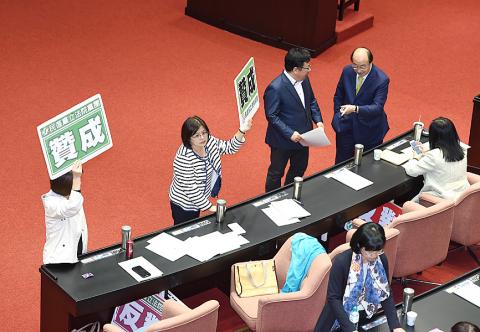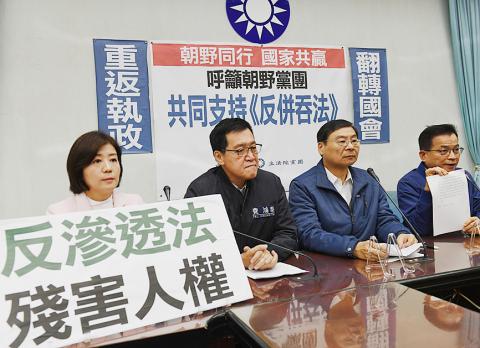The Democratic Progressive Party (DPP) caucus’ version of an anti-infiltration bill yesterday advanced to a second reading and discussion in additional cross-caucus negotiations.
Prior to yesterday’s legislative meeting, DPP caucus members were guarding the speaker’s podium to ensure that the caucus filed motions first.
The caucus sponsored a motion to advance the bill to a second reading, which was not met with any objections, as no Chinese Nationalist Party (KMT) legislators were present.

Photo: Fang Pin-chao, Taipei Times
DPP caucus whip Ker Chien-ming (柯建銘) then filed a motion to have the anti-infiltration bill returned to the legislature’s Procedure Committee for reconsideration — a practice frequently used by the caucus whip of the ruling party during the review of a major bill so that the caucus’ resolve to pass the bill can be reaffirmed.
Ker’s motion was voted down by other caucus members, as well as the three remaining New Power Party legislators — Huang Kuo-chang (黃國昌), Hsu Yung-ming (徐永明) and Jang Show-ling (鄭秀玲) — who apparently vetoed the motion to show support for the bill.
The bill advanced to a second reading without any objection, pending further deliberation during cross-caucus negotiations, which are to be arranged by the DPP caucus, Legislative Speaker Su Jia-chyuan (蘇嘉全) said.

Photo: CNA
On Monday, the DPP caucus unveiled the bill, which would subject those who disrupt the social order under the command or at the request of “infiltration sources” to a prison term of up to seven years or a fine of NT$5 million (US$163,865).
The 12-article draft prohibits anyone from donating to a political party, influencing elections, proposing the recall of a government official or launching a public referendum on the instructions or with the financial support of an infiltration source.
At a news conference at the Legislative Yuan, the KMT caucus — which had unanimously boycotted the legislative meeting — unveiled a bill against annexing the Republic of China (ROC), which it said was meant to replace the anti-infiltration bill.
KMT legislators decided not to vote on the DPP’s motion on a second reading to prevent the DPP from posting the voting results online and portraying the KMT as siding with Beijing on Chinese interference, KMT Legislator Alicia Wang (王育敏) said.
The anti-annexation bill says that no civil servant of the ROC may advocate actions that would sabotage the nation’s political system, or change its official title or territory.
They must not make remarks that advocate decimating, absorbing or replacing the ROC, the bill states.
Civil servants — including the president — found to have contravened the bill would face a prison term of up to seven years, it states.
The anti-annexation bill is a more comprehensive bill than the DPP’s, as it would not only bar attempts to unify Taiwan with China, but would also prohibit attempts to make Taiwan a US state or part of Japan, as these are all actions that would eliminate the ROC, KMT Legislator Lin Wei-chou (林為洲) said.
The KMT caucus would demand that its bill be reviewed side-by-side with the DPP’s during cross-caucus negotiations, KMT caucus whip William Tseng (曾銘宗) said.

CALL FOR SUPPORT: President William Lai called on lawmakers across party lines to ensure the livelihood of Taiwanese and that national security is protected President William Lai (賴清德) yesterday called for bipartisan support for Taiwan’s investment in self-defense capabilities at the christening and launch of two coast guard vessels at CSBC Corp, Taiwan’s (台灣國際造船) shipyard in Kaohsiung. The Taipei (台北) is the fourth and final ship of the Chiayi-class offshore patrol vessels, and the Siraya (西拉雅) is the Coast Guard Administration’s (CGA) first-ever ocean patrol vessel, the government said. The Taipei is the fourth and final ship of the Chiayi-class offshore patrol vessels with a displacement of about 4,000 tonnes, Lai said. This ship class was ordered as a result of former president Tsai Ing-wen’s (蔡英文) 2018

UKRAINE, NVIDIA: The US leader said the subject of Russia’s war had come up ‘very strongly,’ while Jenson Huang was hoping that the conversation was good Chinese President Xi Jinping (習近平) and US President Donald Trump had differing takes following their meeting in Busan, South Korea, yesterday. Xi said that the two sides should complete follow-up work as soon as possible to deliver tangible results that would provide “peace of mind” to China, the US and the rest of the world, while Trump hailed the “great success” of the talks. The two discussed trade, including a deal to reduce tariffs slapped on China for its role in the fentanyl trade, as well as cooperation in ending the war in Ukraine, among other issues, but they did not mention

HOTEL HIRING: An official said that hoteliers could begin hiring migrant workers next year, but must adhere to a rule requiring a NT$2,000 salary hike for Taiwanese The government is to allow the hospitality industry to recruit mid-level migrant workers for housekeeping and three other lines of work after the Executive Yuan yesterday approved a proposal by the Ministry of Labor. A shortage of workers at hotels and accommodation facilities was discussed at a meeting of the legislature’s Transportation Committee. A 2023 survey conducted by the Tourism Administration found that Taiwan’s lodging industry was short of about 6,600 housekeeping and cleaning workers, the agency said in a report to the committee. The shortage of workers in the industry is being studied, the report said. Hotel and Lodging Division Deputy Director Cheng

‘SECRETS’: While saying China would not attack during his presidency, Donald Trump declined to say how Washington would respond if Beijing were to take military action US President Donald Trump said that China would not take military action against Taiwan while he is president, as the Chinese leaders “know the consequences.” Trump made the statement during an interview on CBS’ 60 Minutes program that aired on Sunday, a few days after his meeting with Chinese President Xi Jinping (習近平) in South Korea. “He [Xi] has openly said, and his people have openly said at meetings, ‘we would never do anything while President Trump is president,’ because they know the consequences,” Trump said in the interview. However, he repeatedly declined to say exactly how Washington would respond in